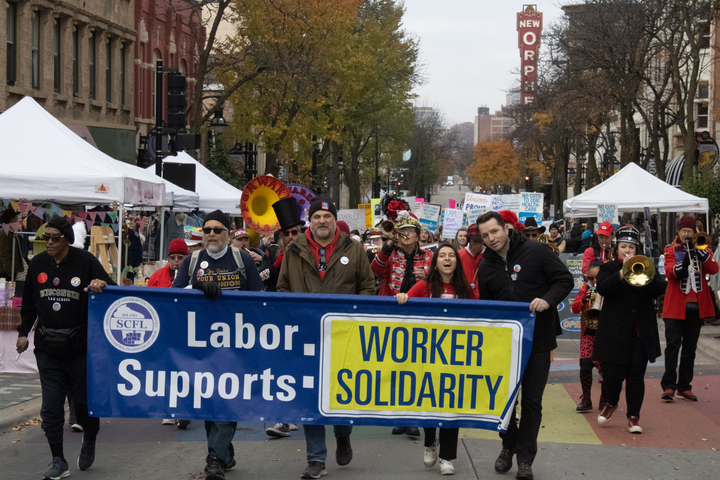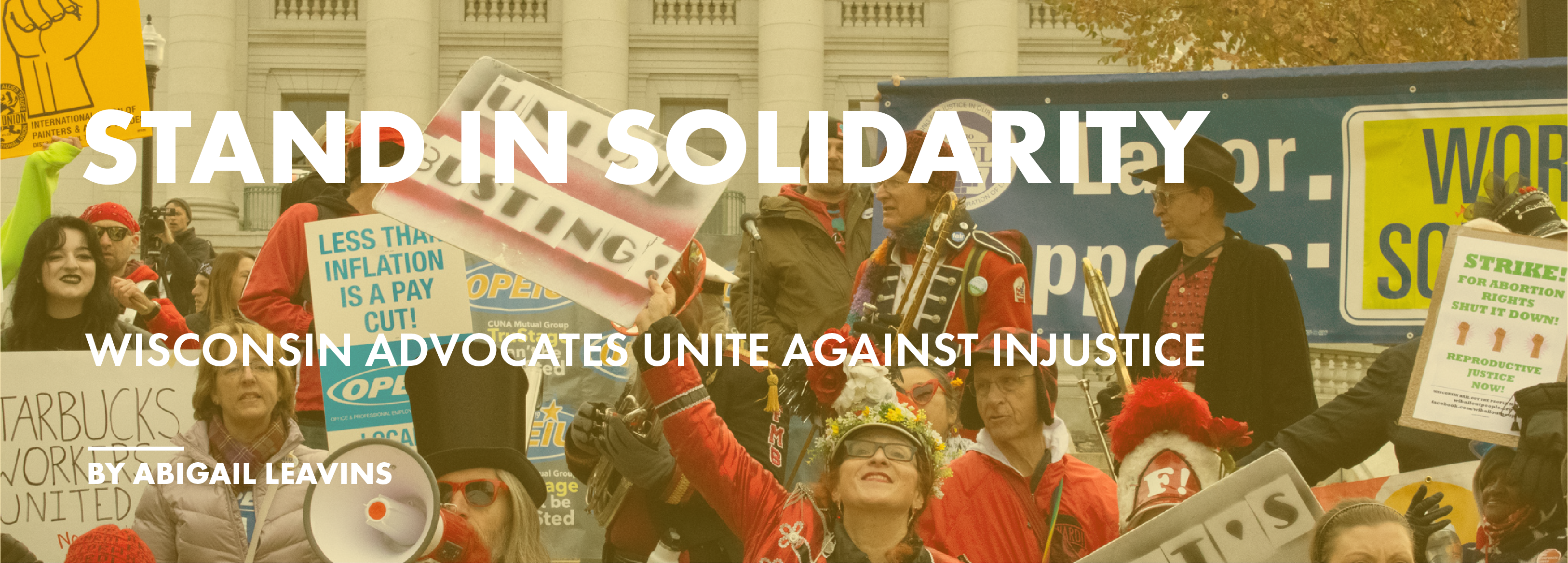Stephanie Salgado came to the U.S. from Honduras when they were 14 years old. They say it didn’t take them long to realize that not everyone was treated the same.
As a queer woman, Salgado realized they were treated differently based on their gender, which led them to realize systemic issues of gender inequality.
“The second thing I learned was that there’s no people like me in the conversation,” Salgado says about their time in climate advocacy.
Since then, Salgado has pushed for the importance of advocacy. They see why it’s important to stand up for oneself and never to forget to stand up for others in the process, especially because of where they are from, and to ensure the stories of communities of color and the narratives of immigrants and Black and Indigenous communities are told.

And Salgado is not the only one.
Unions and advocacy groups have joined together around Madison and Wisconsin to support one another and fight for change, knowing they are stronger together. Immigrant rights organizations have attended unfair labor practice strikes for insurance workers, and labor unions are organizing joint rallies to show support for each other.
Union organization is not a new phenomenon, but despite the ongoing decline in membership — about 7% of Wisconsin wage and salary workers are part of a union — it makes up a bigger part of the conversation in Wisconsin in 2023.
“I’ve seen activism and advocacy as something intersectional,” Salgado says.
Salgado, now 22, is the Madison representative for Voces de la Frontera, an organization led by low-wage workers, immigrants and youth who fight for civil rights and workers’ rights.
Salgado started as an advocate for climate justice, joining Gov. Tony Evers’ Task Force on Climate Change as a college student. At first, Salgado doubted themself because they were the youngest person in the room at 18 years old. However, they also noticed few women and people of color in the room.
“That’s when I knew I was like, ‘Oh s—, I really need to be here,’” Salgado says. “And I need to be the voice to call [for] urgency.”
Workers from TruStage, formerly known as CUNA Mutual Group, were on strike for a little more than two weeks in May and June 2023 over accusations of unfair labor practices. Wisconsin autoworkers joined the United Auto Workers strike in September, seeking higher wages, cost of living benefits and a more even playing field for new hires.
The State Street Starbucks location announced in April it would be the second downtown Madison Starbucks store to officially unionize. These examples do not even include the nurses, UPS workers, Faith Voices for Justice and several other groups that have organized this year.
Joe Evica, the chief steward of OPEIU, a union made up of workers from the insurance company TruStage, also values advocacy that is interconnected — specifically tuned to the rights of immigrant workers. He points out that immigrants make up a lot of the laborers, and fighting for one group is fighting for another.
“Ultimately, the forces that we’re opposed to are pretty well overlapping,” Evica says.
Salgado says they noticed a system of oppression against many groups of people when they moved to the U.S. in 2015. They had heard of civil disobedience and activism against unjust powers but didn’t think they could be an advocate. As an immigrant, Salgado feared they would be deported if they questioned authority in any way.
But Salgado was passionate about the injustices they noticed and started organizing with the people around them anyway. They now advocate on several platforms, including racial justice, immigration justice, climate justice and gender justice. Salgado says it is important to work on these simultaneously to break away from capitalism and lift marginalized voices.
“There’s going to be no liberation unless we lift up everyone on the bottom,” Salgado says.
Evica says community support from groups like Voces de la Frontera was huge for TruStage workers this summer.
It might seem strange to some that a labor union and immigrant rights organization even care about supporting each other, Evica says. But he argues both groups experience injustice — and the unjust treatment often overlaps.
“It’s kind of the broader issue of an injury to one is an injury to all,” Evica says. “So when you see that immigrant workers are under attack, you have to understand that it’s a divide-and-conquer strategy that’s meant to really affect all workers.”
Frank Emspak, a professor emeritus in the School for Workers at UW–Madison and a producer for WORT Labor Radio, says unions that unite typically have more success. However, he points out that some unions do not appreciate the ideology of unionization and focus on the narrow gains of their individual cause. In Emspak’s view, however, if leaders have a more expansive vision, there will be increased cooperation between unions.
“You can play one off against the other and you come out ahead from the worker’s point of view,” Emspak says. “And if two unions can cooperate, they usually come out better.”
Emspak adds that cooperation between labor unions and immigrants has happened for years. He points to garment workers’ unions in New York in the 1920s and 1930s made up of mostly immigrants.
Nindik Figueredo, the Madison essential workers organizer for Voces de la Frontera, agrees community solidarity is important.
“It is important that the unions — the alliances — continue to strengthen themselves, because workers are able to receive protection more easily, as opposed to walking alone, because if the unions and alliances are not together or not collaborating, it’s going to be harder to protect them,” Figueredo said through her husband Luis Velasquez, who translated from Spanish to English.
Figueredo says advocacy is important to her because many immigrants don’t understand their rights. They might be exploited at work and don’t realize they deserve to be treated better.
Additionally, Salgado believes society has not normalized the idea of young people advocating for themselves. Instead, society might “tokenize” young people by not taking them seriously. So Salgado not only fights for immigrant rights, but they also joined the Wisconsin Student Climate Action Coalition when they were in school.
While advocating for climate justice, Salgado realized the importance of all kinds of advocacy. They say it made them more aware of their Latinx, queer and immigrant identities. Because Salgado sees all of these identities in themself, they say they have to see all activism as interconnected.
To Salgado, this means that advocating for others is huge.
“How can we collect our dreams towards liberation together to work towards something that we’re both passionate about?” Salgado asks.
Salgado says all groups are fighting for liberation. Everyone wants their cause to succeed, but achieving liberation requires unity. When people don’t unite, they’re more likely to burn out.
“When we don’t act in solidarity with one another and understand what’s almost the common good between us, it’s very hard because you’re fighting for the scraps, you’re fighting for one piece of the pie,” Salgado says.
